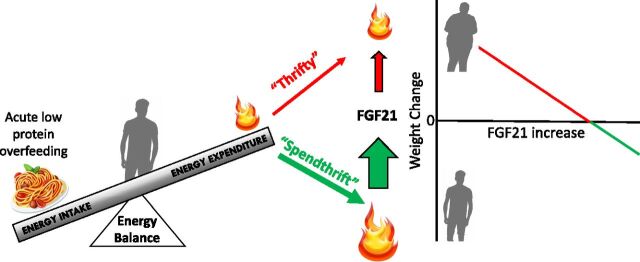Figure 1.
The hypothesized relationship between energy expenditure, FGF21, and body weight regulation. Stimulating energy expenditure with acute low-protein overfeeding can identify individuals who are able to dissipate the excess calories consumed as heat (“spendthrift”) versus those who cannot (“thrifty”). The magnitude of the increase in plasma concentration of FGF21 in response to acute low-protein overfeeding is positively associated with the acute change in 24-h energy expenditure. Thrifty individuals have an attenuated increase in FGF21 in response to acute low-protein overfeeding and are more susceptible to weight gain over 6 months.

